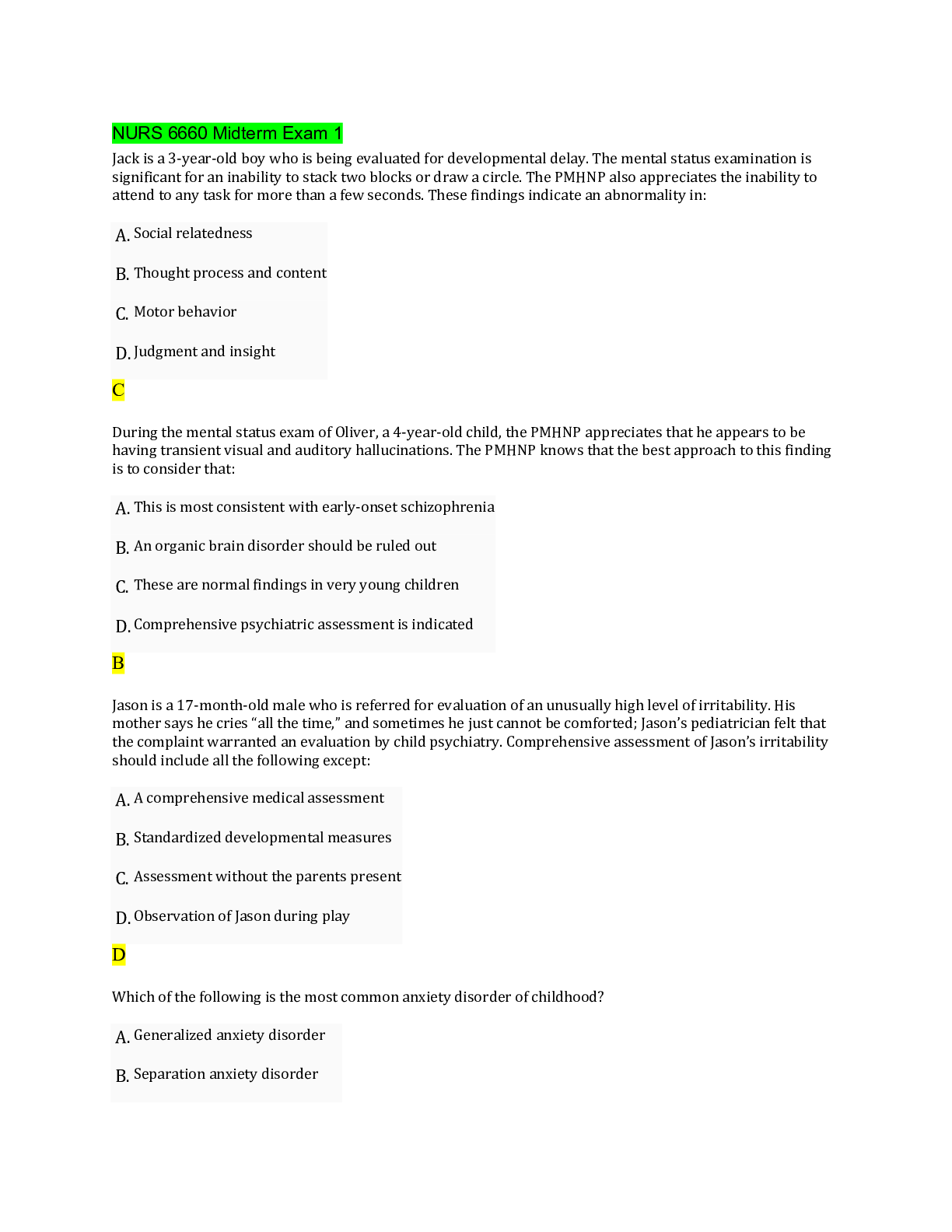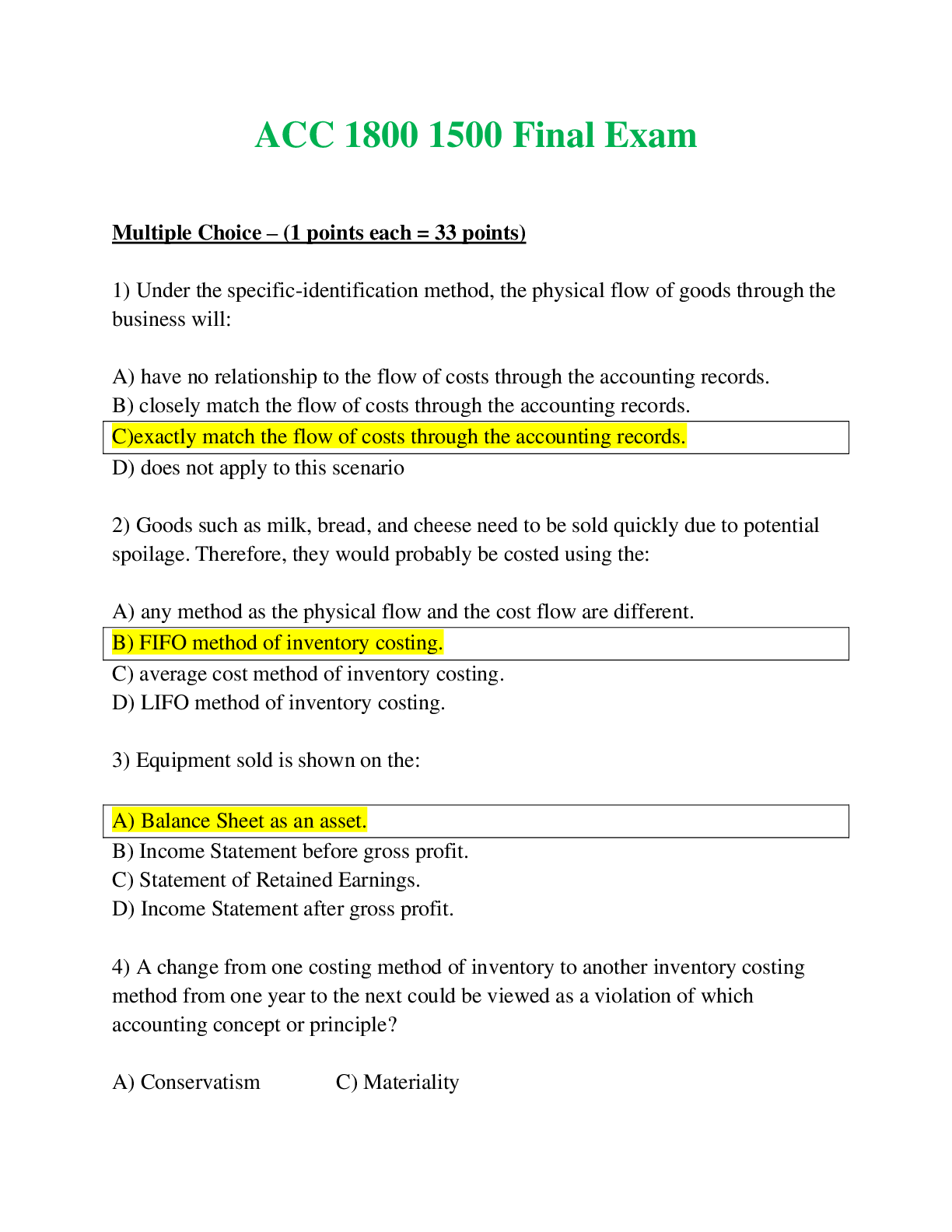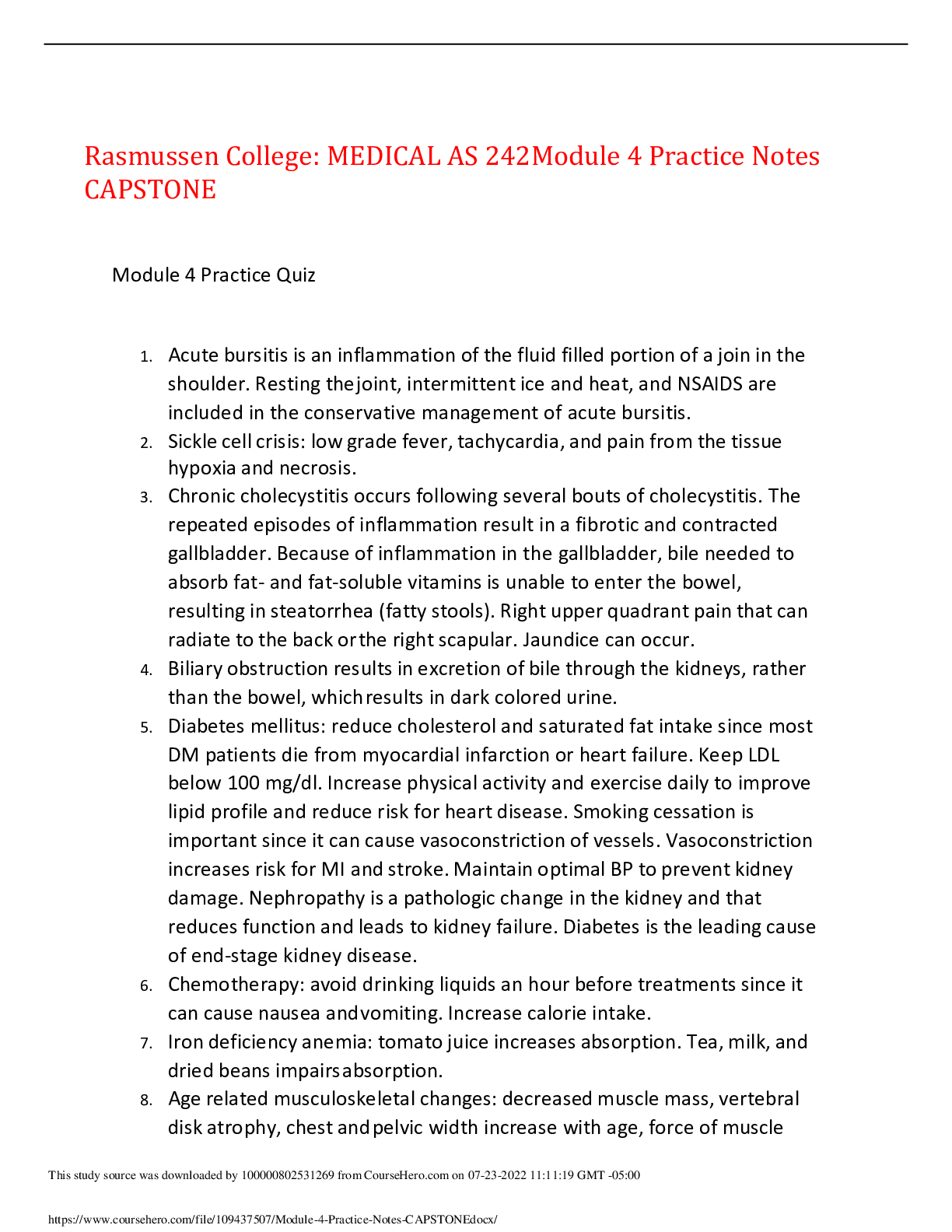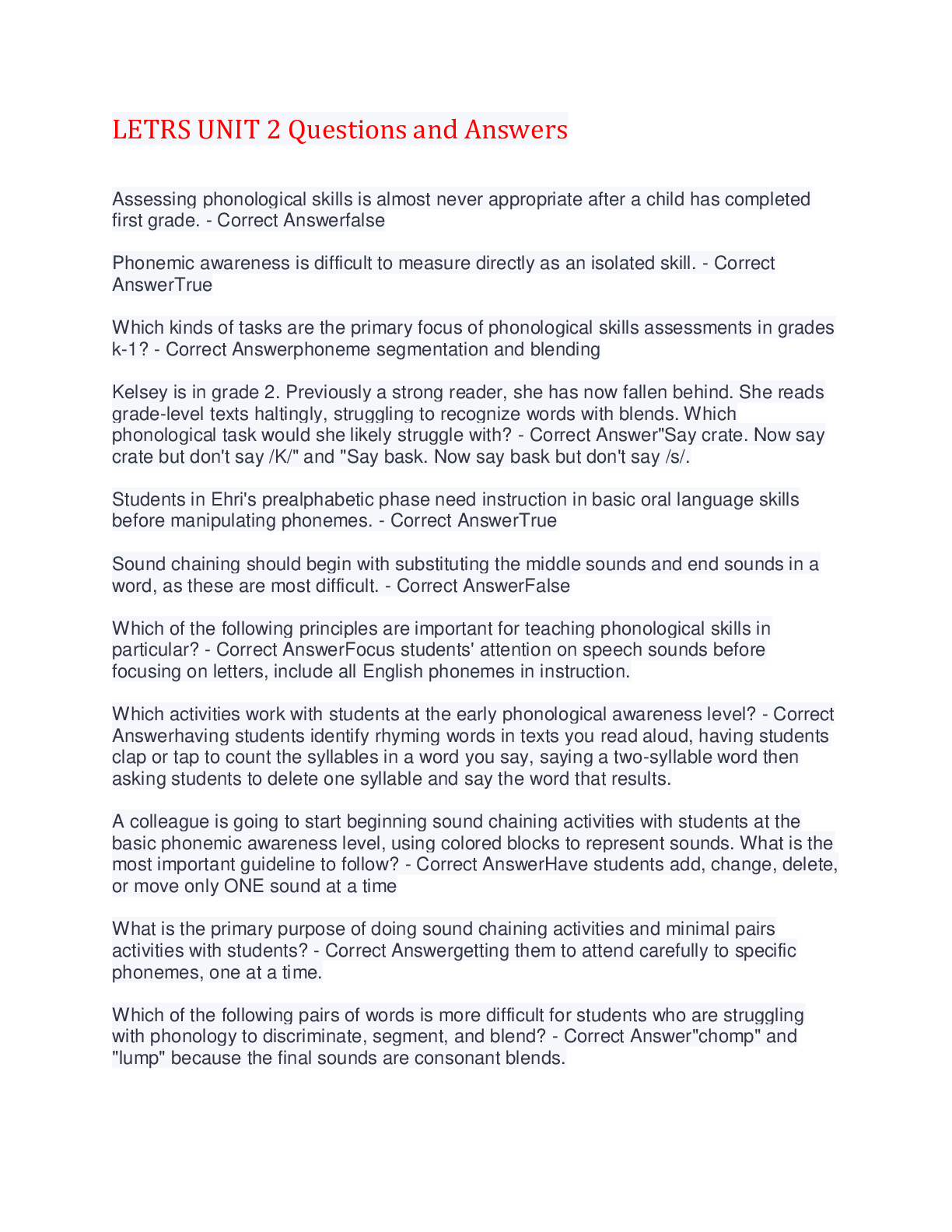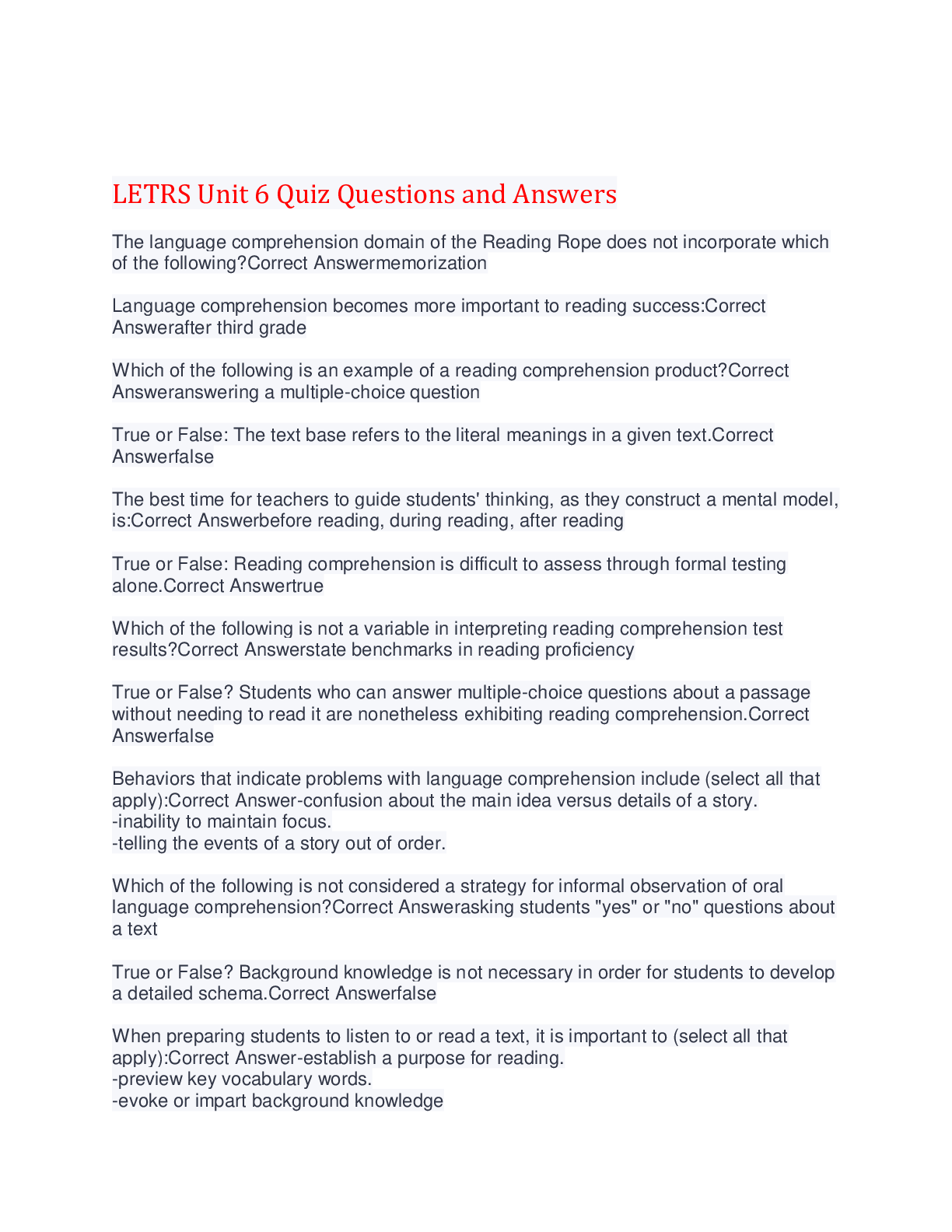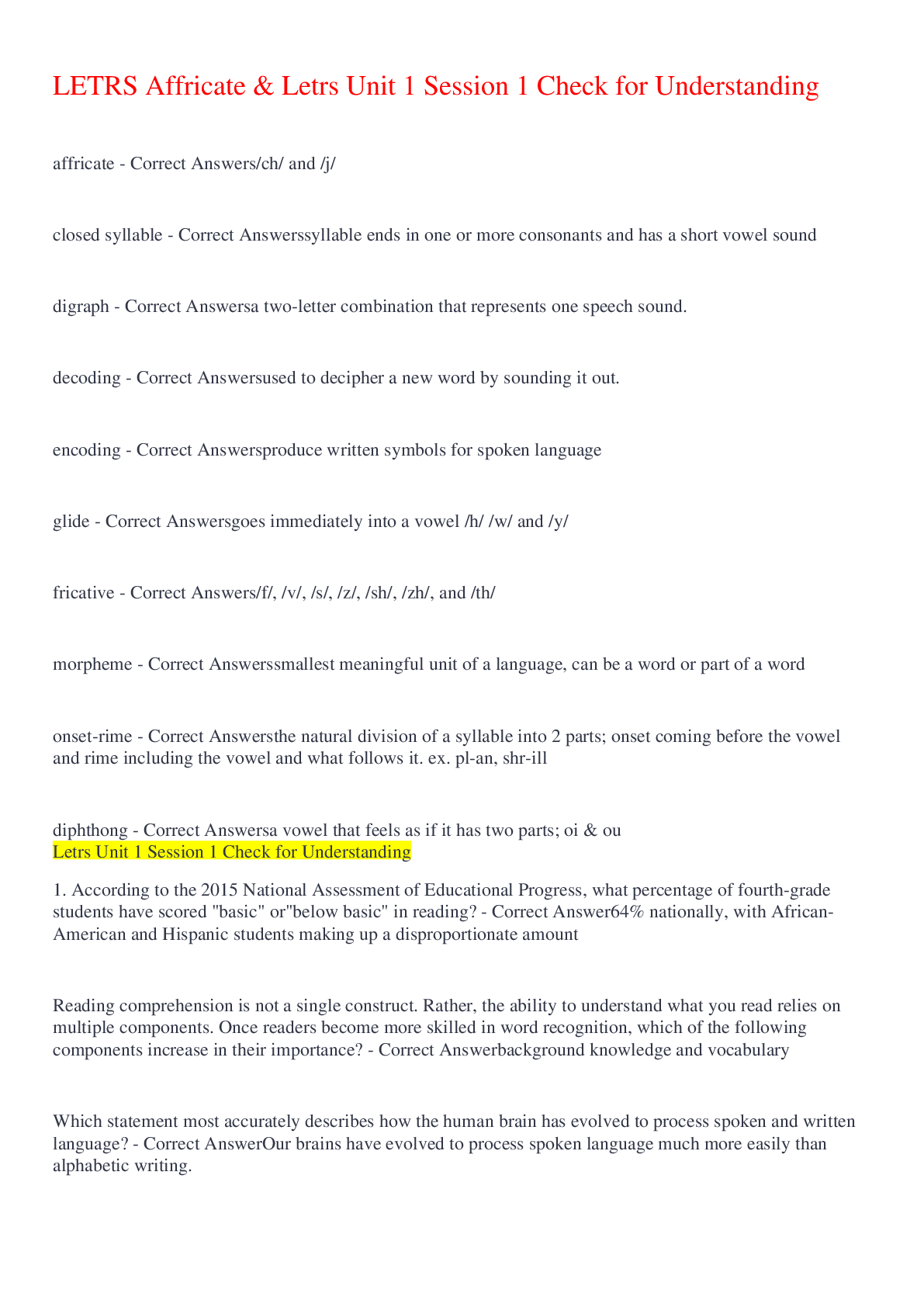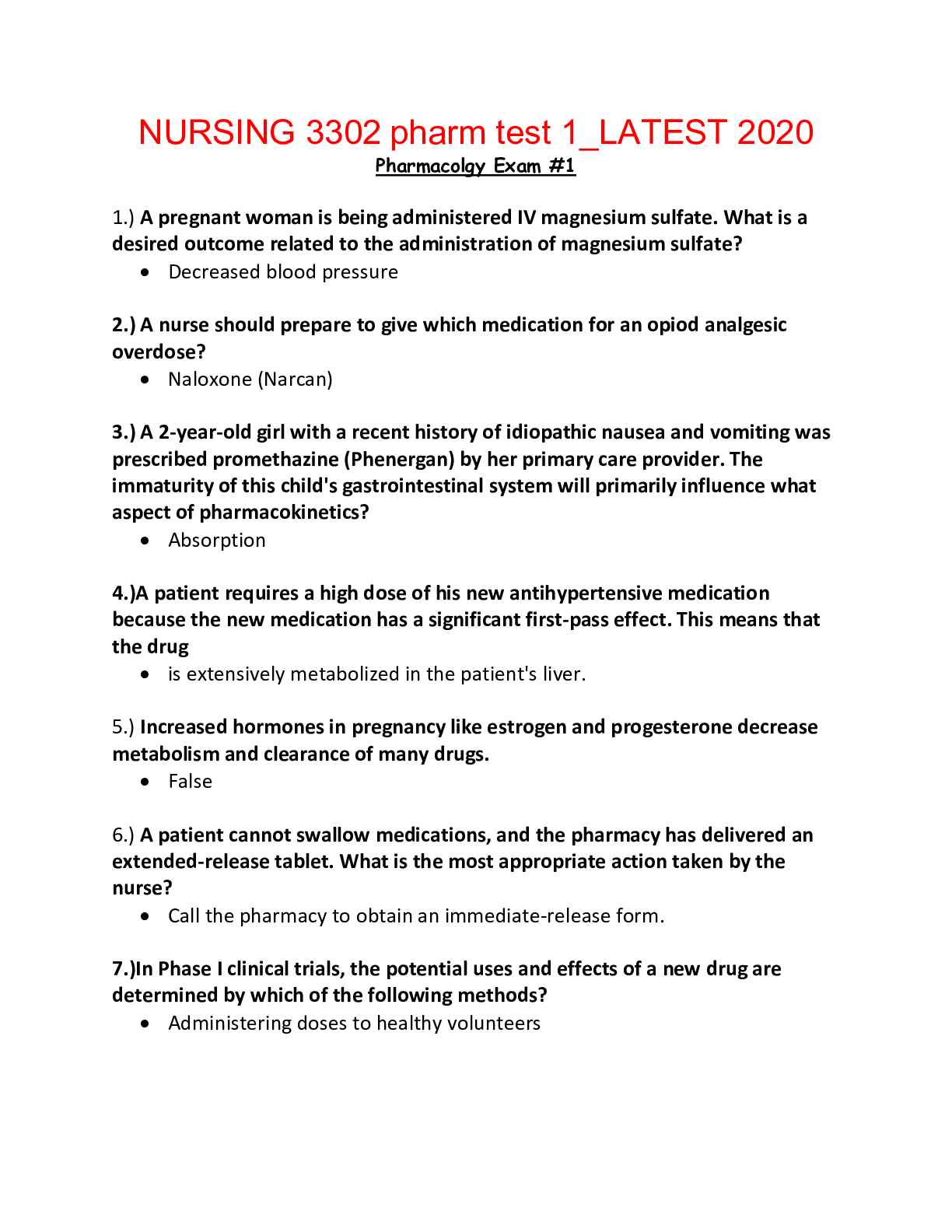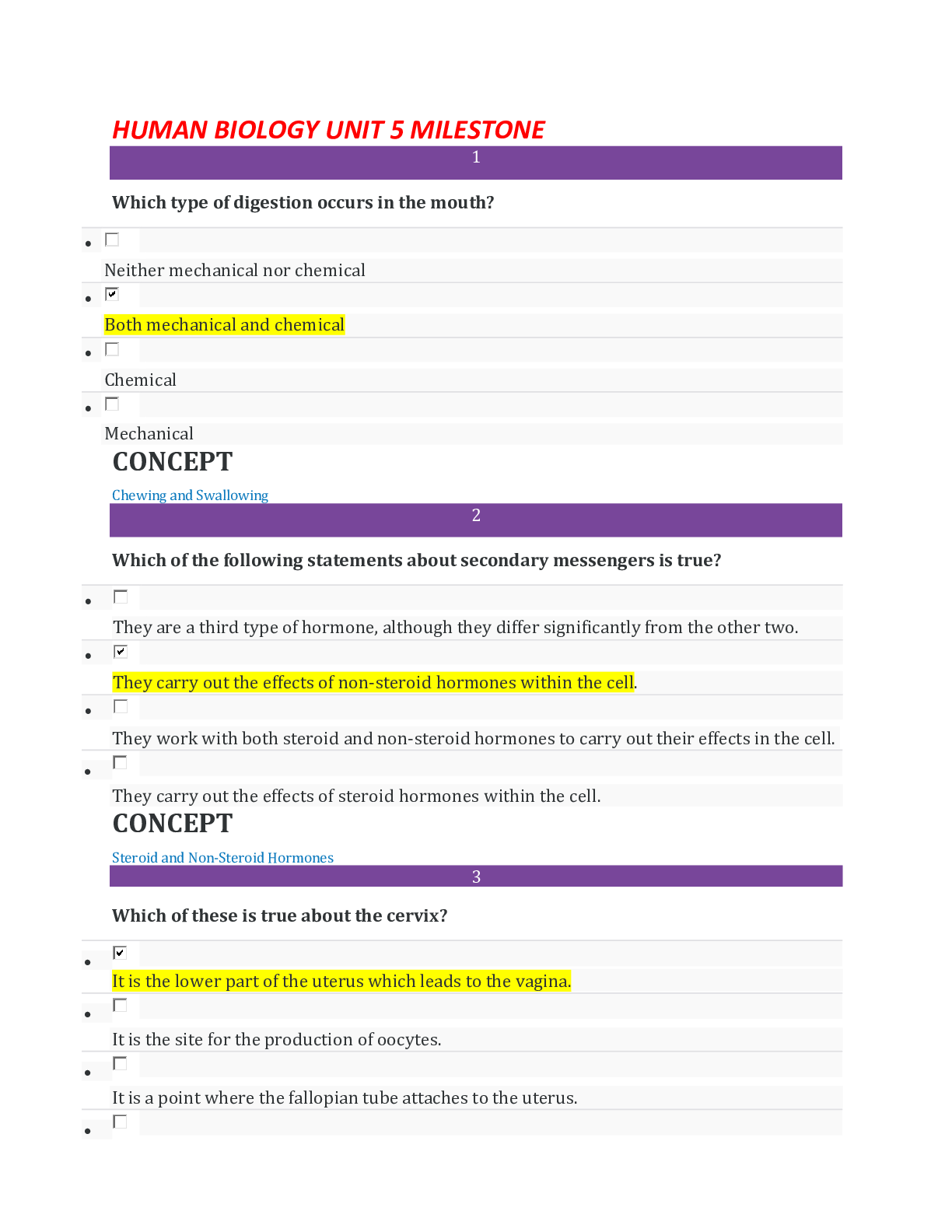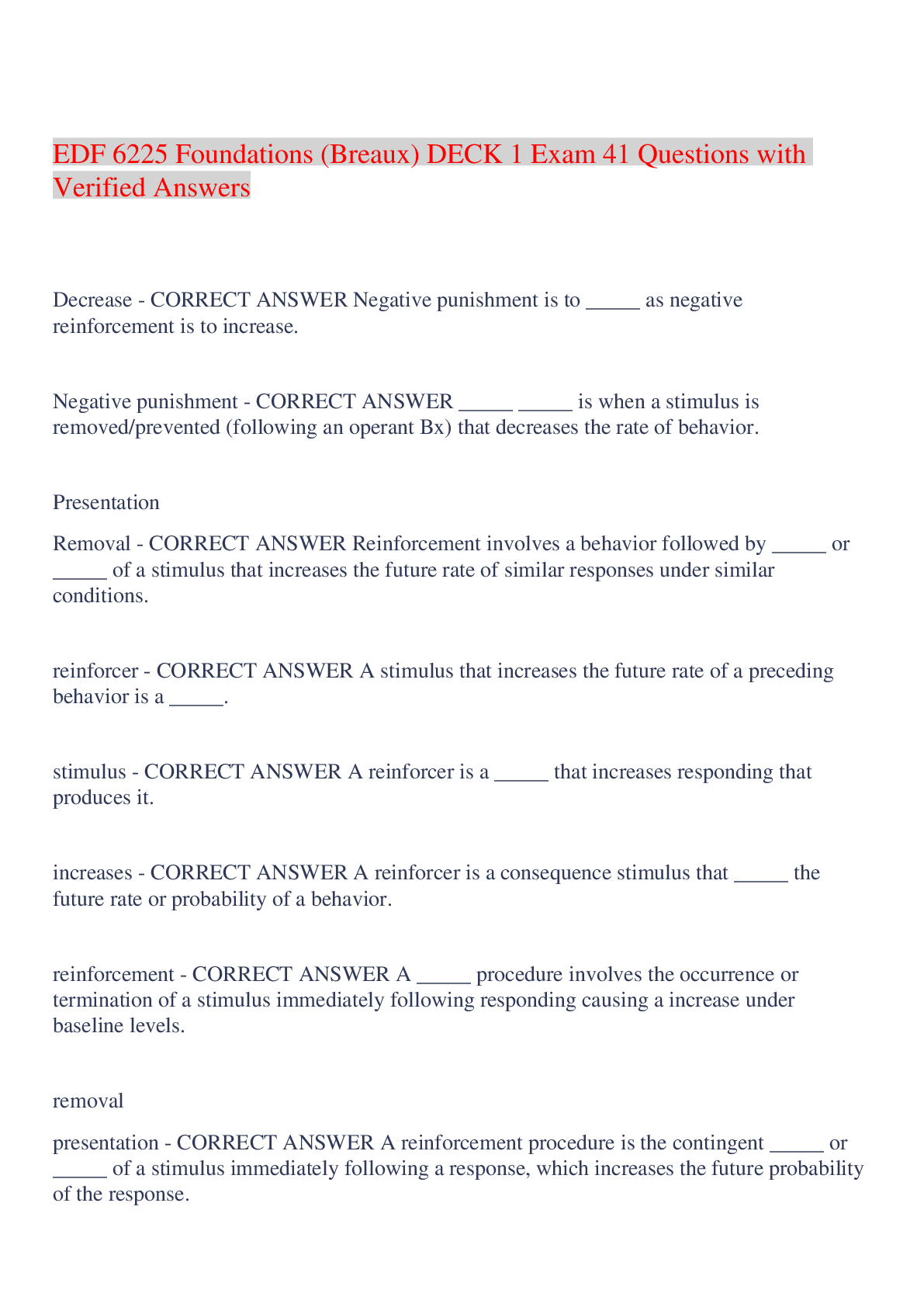NUR 108: Module 7 Evaluate, NCLEX-RN Style Questions & Answers,100% CORRECT
Document Content and Description Below
NUR 108: Module 7 Evaluate, NCLEX-RN Style Questions & Answers Question 1: Multiple Choice – During delegation, the RN considers whether the assignment that needs to be done requires the assessm... ent skills of the RN to be performed safely. This exemplifies which of the delegation “rights”? a. Person b. Feedback c. Supervision d. Communication Response A PERSON Rationale – This is the appropriate response as the nurse is determining who the appropriate person in for the task, and if that person is qualified to perform the task. Feedback is getting information back to determine if/how the process can be improved. Supervision is following up to see if the patients’ needs are met. Communication is making sure that the task is explained appropriately, instructions are clear and who how and when to report changes is made clear. (Catalano, 2015, P.401) Reference: Catalano, J. T. (2015). Nursing now! todays issues, tomorrows trends. Philadelphia: F.A. Davis Company. Question 2: Multiple Answer Which situations are appropriate for the registered nurse (RN) to delegate patient care to the licensed practical nurse (LPN)? Select all that apply. a. There is adequate staffing and sufficient time for supervision. b. The task being delegated is identified as part of the LPN job description. c. An admission assessment must be completed for the patient. d. The LPN is needed to care for a critical patient. e. Repeated assessment of an unstable patient is necessary. Response: A=There is adequate staffing and sufficient time for supervision and B=The task being delegated is identified as part of the LPN job description Rationale adequate staffing and sufficient time for supervision is necessary in any type of delegation as the RN must supervise the person any task is delegated to. The task must be part of the job description of the person you are delegating to within the nurse’s state practice act. (Catalano, 2015, p.397) Admission assessments are the RN’s responsibility, to be sure that patient needs do not go untreated. (Catalano, 2015, p398). LPN should not care for a critical patient or perform repeated assessment of an unstable patient to make sure that no patient need is missed, as an RN should not delegate unless it is “relatively uncomplicated and routine, must be performed without variation from policy and procedure and should not require the use of nursing judgement while being performed.” (Catalano, 2015, p.398) Reference Catalano, J. T. (2015). Nursing now! todays issues, tomorrows trends. Philadelphia: F.A. Davis Company. Question 3: Multiple Choice Which is an example of appropriate delegation? a. The RN assigns the AP to ambulate the patient in the hall. b. The RN requests the LPN assess the patient’s breath sounds and call the health care provider. c. The RN asks the LPN to teach the AP how to administer a gastric tube feeding to a patient. d. The RN instructs the AP to give a nebulizer treatment. Response A=The RN assigns the AP to ambulate the patient in the hall. Rationale It is within the scope of practice for an AP to ambulate a patient in the hallway. An LPN should report to the RN who has delegated a task to them not circumvent them and speak to the physician. Education is a task reserved for RNs, LPNs may provide education for basic ADL, IADL care however specialized education is reserved to the RN. A nebulized treatment is out of the scope of practice for AP. “When a nurse delegates tasks, the outcomes of tasks should be clear and predictable…The task should not require excessive supervision, complex decision making, or detailed assessment during performance. If any of these elements are required, it needs to be reassigned to an RN” (Catalano, 2015, p.401) Reference Catalano, J. T. (2015). Nursing now! todays issues, tomorrows trends. Philadelphia: F.A. Davis Company. Question 4: Multiple Choice Which task is appropriate for the RN to delegate to the assistive personnel (AP)? a. Assessing the drainage in the patient’s chest tube. b. Turning and repositioning a patient who has just returned from spinal surgery. c. Assisting a patient on contact precautions with oral care. d. Ambulating a new post-operative patient to the bathroom for the first time. Response C=Assisting a patient on contact precautions with oral care Rationale Assisting a patient with oral care is within their scope of practice. Assessing drainage would require assessment and that is reserved for the RN as it may not be uncomplicated and routine. Turning and repositioning a patient who has just returned form spinal surgery may require nursing judgement. Assisting a new post op patient to the restroom for the first time may indicate that assessment is necessary during this ambulation meaning it should also be delegated to an RN. “Assessing clients is a designated responsibility of RNs…Also, tasks being delegated must be relatively uncomplicated and routine, must be performed without variation from policy or procedure and should not require the use of nursing judgement while being performed.” (Catalano, 2015, p.398) Reference Catalano, J. T. (2015). Nursing now! todays issues, tomorrows trends. Philadelphia: F.A. Davis Company. Question 5: Multiple Choice What term is exemplified when an institutional policy allows unlicensed assistive personnel to carry out professional nursing functions? a. Direct delegation b. Indirect delegation c. Predictable delegation d. Uncomplicated delegation Response B=Indirect delegation - Rationale When a health-care facility provides a list of duties that certain healthcare personnel can perform and takes the RNs right to determine who may complete a task. (Catalano, 2015, p.406) Direct delegation is when an RN can make the determines who can perform tasks. (Catalano, 2015, p.406) Predictable and Uncomplicated is what the outcome of any tasks delegated by an RN should be. (Catalano, 2015, p.401) Reference Catalano, J. T. (2015). Nursing now! todays issues, tomorrows trends. Philadelphia: F.A. Davis Company. Question 6: Multiple Choice The RN is caring for a client who requires furosemide 20mg intravenous push. Which team member can the RN ask to administer the intravenous push medication? a. Licensed practical nurse b. Registered nurse c. Certified nursing assistant d. Medication technician Response B=Registered Nurse Rationale Care an RN must complete Admission assessment, IV meds, blood products, care plan, client teaching, unstable clients and acute diseases, care an LPN may complete vital signs, uncomplicated skills, stable clients, chronic diseases, Oral and IM medications, care UAP may provide, feeding, basic hygiene, basic skills, stable clients, chronic diseases and ambulation. ( Catalano, 2015, p.407) Reference Catalano, J. T. (2015). Nursing now! todays issues, tomorrows trends. Philadelphia: F.A. Davis Company. Question 7: Multiple Choice Which right of delegation is demonstrated when the RN asks the assistive personnel to report back to the RN when the client voids? a. Right person b. Right task c. Right supervision d. Right communication Response D= Right Communication- Rationale:The right person is determining if the person has the qualification to perform the task. Right task is making sure the task falls under the scope of practice for the person and the facility policy.. Right supervision is hand in had with feedback-figuring out if and how we can improve our methods of meeting patient needs. Right Communication is making sure that the directions are clear as to the task and who, how and how often to report back. (Catalano, 2015, p.401) Reference: Catalano, J. T. (2015). Nursing now! todays issues, tomorrows trends. Philadelphia: F.A. Davis Company. Question 8: Multiple Choice Which RN action demonstrates the final step in delegation? a. Assign tasks to the assistive personnel (AP) b. Meet to discuss feedback with the assistive personnel (AP) c. Select the appropriate assistive personnel for the task (AP) d. Identify the client’s needs with the assistive personnel (AP Response B=Meet to discuss feedback with the assistive personnel Rationale: Identifying patients’ needs should be done at the beginning, selecting appropriate staff would include making sure they are qualified to meet the patient needs delegated to them, making sure they understand the task and how to complete/report back would be after making sure they are qualified and it is in line with policy. After the tasks have been completed following up to see how we can improve to better meet patient needs is an important step that will conclude the initial cycle of delegation. Reference Question 9: Multiple Choice What is the priority RN action to use when an assistive personnel (AP) states they do not know how to perform ambulation for a client with a chest tube? a. Refuse to work with the assistive personnel b. Ask the employer to validate ambulation competency c. Provide immediate teaching for ambulating a client with a chest tube d. Locate a team member who is competent in performing the ambulation. Response D= Locate a team member who is competent in performing the ambulation. Rationale Education would ideal, however the person must not only be trained they must be proficient in the task. This may take more time than an initial education session. You will want to go with them and have them demonstrate that they are proficient and understand the task as well as that they are able to perform it. Refusing to work with them would not help your patient of them. Asking the employer to validate ambulation competency may take longer than you have and they are verbalizing that they do not understand the task assigned. Locating a team member who is competent is a good second step if the AP is not proficient after training them. “ RNs who delegate are also responsible for educating the UAP about the task to be done. If the UAP is unfamiliar with the task, the RN is required to demonstrate how the task of procedure is performed and then document the training. Education also includes what is expected in the completion of the task and what complications to watch out for and report to the RN, the ANA suggests that the RN watch the UAP perform the designated task at least initially then make periodic observations throughout the shift to ensure safe and competent care for the client furthermore the RN must always be available to answer questions and help the UAP whenever assistance is required.” (Catalano, 2015, p.399) Reference: Catalano, J. T. (2015). Nursing now! todays issues, tomorrows trends. Philadelphia: F.A. Davis Company. Question 10: Multiple Choice Create one unique, multiple-choice question about delegation in nursing. What is the appropriate task for an RN to delegate to an LPN on shift with them? A auscultate bowel sound on a post-operative patient and report findings back to physician B monitor vital signs every 15 minutes for a client receiving blood product C monitor and record urine output for renal patient every hour and report back to RN D educating patient and family about insulin use and diabetic education for a newly diagnosed patient who is stable and awaiting discharge Provide the Correct Response: C= monitor urine output for renal patient every hour and report back to RN. This is a low risk low skill level task that does not require assessment of nursing judgement. The bowel sounds of a post op patient is an assessment that an RN should make and report back as the possibility of a bowel issue could be missed, a patient with blood products hanging should be cared for by an RN, Education is also a designated RN task. Care an RN must complete Admission assessment, IV meds, blood products, care plan, client teaching, unstable clients and acute diseases, care an LPN may complete vital signs, uncomplicated skills, stable clients, chronic diseases, Oral and IM medications, care UAP may provide, feeding, basic hygiene, basic skills, stable clients, chronic diseases and ambulation. ( Catalano, 2015, p.407) “Assessing clients is a designated responsibility of RNs…Also, tasks being delegated must be relatively uncomplicated and routine, must be performed without variation from policy or procedure and should not require the use of nursing judgement while being performed.” (Catalano, 2015, p.398) Catalano, J. T. (2015). Nursing now! todays issues, tomorrows trends. Philadelphia: F.A. Davis Company. [Show More]
Last updated: 2 years ago
Preview 1 out of 13 pages
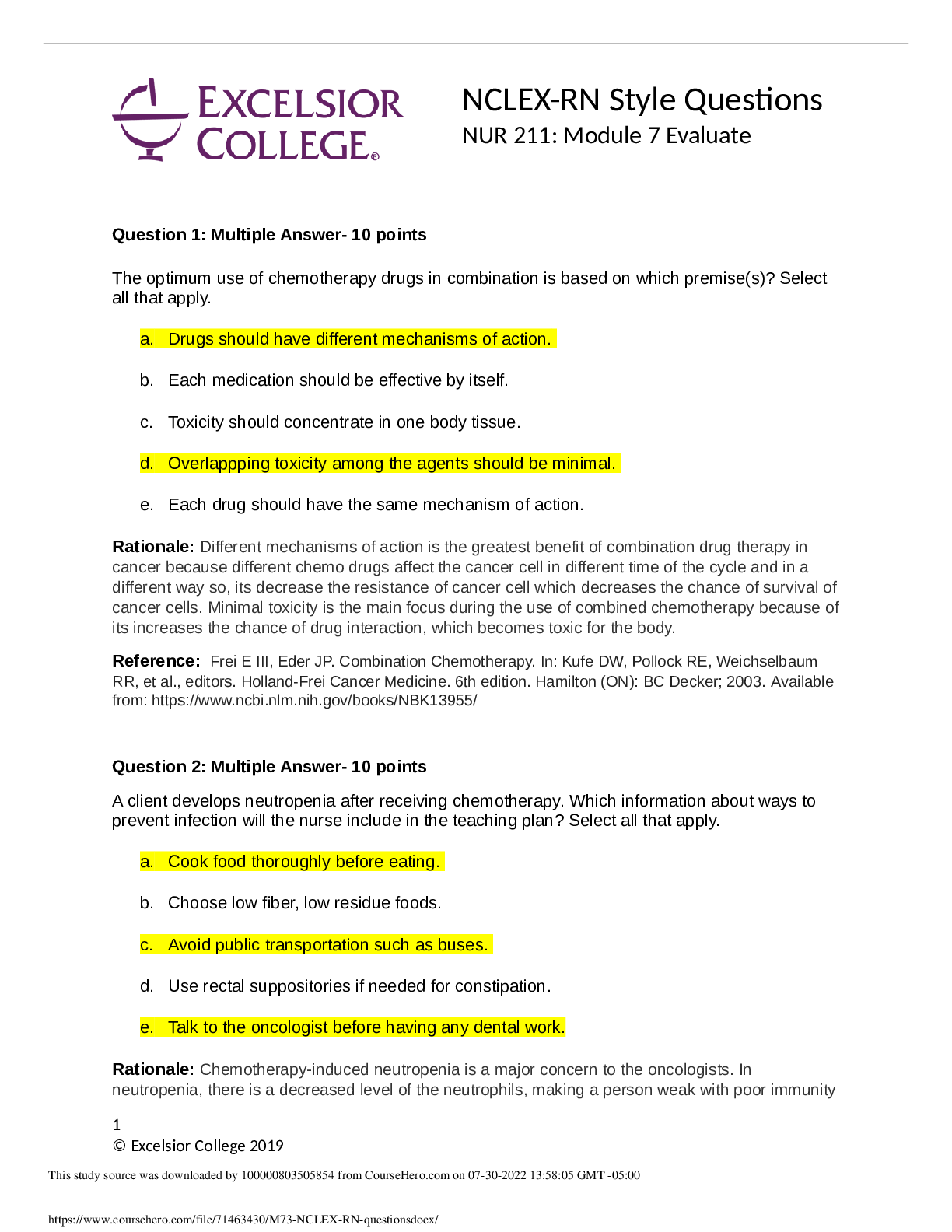
Buy this document to get the full access instantly
Instant Download Access after purchase
Buy NowInstant download
We Accept:

Reviews( 0 )
$9.00
Can't find what you want? Try our AI powered Search
Document information
Connected school, study & course
About the document
Uploaded On
Oct 13, 2021
Number of pages
13
Written in
Additional information
This document has been written for:
Uploaded
Oct 13, 2021
Downloads
0
Views
66


